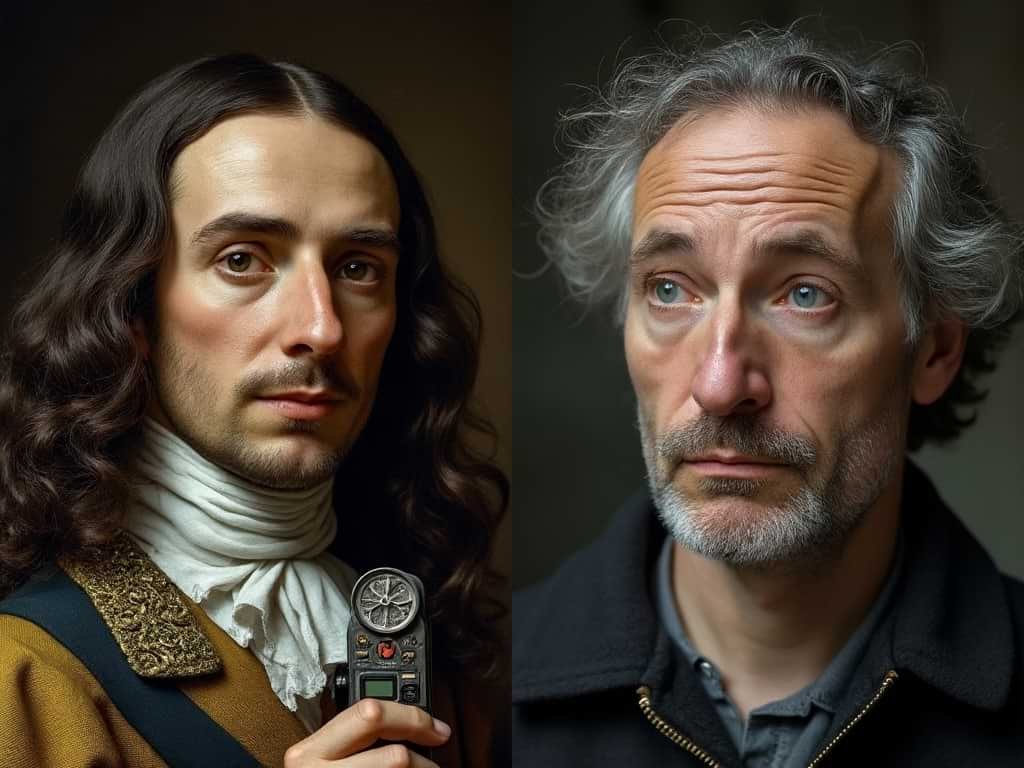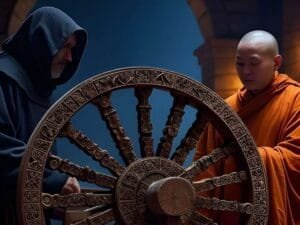Journey through the brilliant mind of Blaise Pascal, a 17th-century polymath who dared to embrace both scientific rigor and life’s deepest mysteries. In an age where secular dualists claim all can be explained through science, discover how this mathematical genius who invented the calculator at 19 came to recognize that the most important truths transcend human cognition.
Table of contents
Introduction
Secular dualists typically believe in a world separate from consciousness (“the objective reality”) but reject the notion of the impenetrable, the mysterious—”the divine.” They hope or believe that all questions can be answered by science studying the natural world. But have you ever felt that a secular dualist has clearly explained consciousness to you? I certainly haven’t. We shouldn’t overlook the boundaries of human conceptual knowledge.
Here’s a question lacking a definitive conceptual answer: Why is there a universe? And another, straightforward example of a conceptual-knowledge limit: Butterflies see the color ultraviolet but humans don’t. So humans will never know what it’s like to see the color ultraviolet. What else is there that we will never perceive in the immense universe? Chances are, a lot! The human cognitive perspective is far more limited than we sometimes realize because we tend to put ourselves central in our worldview.
Still today, we can learn from what great thinkers have said about our limitations. One of such great minds is Blaise Pascal. His ability to balance science and rational thought with an acknowledgment of their limitations is truly inspirational, whether you conceive a Christian God or not. My personal stance about what’s beyond the human mind (the unknowable, the mystery, the beyond-natural) is recognition and acceptance, in other words, agnosticism. Claiming knowledge of the unknowable, whether affirmation or denial, is a contradiction. Still, in my books Oneless Oneness, Awakening the Other Way, and Sanity, I follow Pascal’s example of applying reason to existential questions beyond science.
Born in 1623, Pascal was a child prodigy who made significant contributions to mathematics and physics before turning his attention to philosophy and theology. His invention of the mechanical calculator at the age of 19 and his groundbreaking work on probability theory demonstrate his commitment to rational inquiry and scientific advancement. Yet, Pascal’s famous “night of fire” in 1654, a profound religious experience that led him to devote his life to Christianity, illustrates his recognition that not all truths can be grasped through cognition alone. This reconciliation of opposites in Pascal’s approach—embracing both scientific rigor and unprompted intuition—is still relevant in today’s public discourse that hinges on a sharp division between “objective, scientific” versus “subjective” knowledge.
Pascal’s critical thinking skills are evident not only in his scientific work but also in his approach to existential questions. His development of Pascal’s law in hydrostatics and his experiments with atmospheric pressure showcase his analytical prowess. His ability to apply this same rigorous thinking to matters of faith and human nature shows he’s not only a genius but also wise. Pascal’s exploration of the “three orders”—the physical, the intellectual, and the spiritual—in his Pensées demonstrates his subtle understanding of different modes of knowing.
His famous quote, “The heart has its reasons which reason knows nothing of,” encapsulates his recognition of the limits of human knowledge. Pascal’s balanced approach, respecting both rational thought and the mysteries that lie beyond it, is still a model for modern thinkers in our polarized intellectual landscape.

Blaise Pascal’s Pensées: a journey through rational thought and spirituality
Few theological works have challenged philosophical minds quite like Blaise Pascal’s Pensées. This posthumously published collection of fragments offers a profound exploration of human nature, faith, and reason, inviting readers to engage in rational thought in existential questions.
Pascal, a 17th-century French mathematician, physicist, and theologian, left behind a legacy that continues to influence modern philosophy and apologetics. The Pensées, which translates to “Thoughts” in English, represents Pascal’s unfinished magnum opus—a planned defense of the Christian faith that evolved into a wide-ranging examination of the human condition.
This article presents eight timeless phrases of the Pensées, exploring how Pascal’s insights can inform our understanding of the ties between faith and reason. By examining Pascal’s most famous quotes and the context in which they were written, we’ll uncover the enduring relevance of his work.
The human condition: between greatness and wretchedness
1. “Man is but a reed, the most feeble thing in nature, but he is a thinking reed.”
Pascal begins his exploration of the human condition by highlighting the paradoxical nature of human existence. This famous quote encapsulates his view that humans occupy a unique position in the universe—simultaneously insignificant in the grand scheme of things, yet possessing the remarkable capacity for thought and self-reflection.
This tension between human greatness and wretchedness forms a central theme throughout the Pensées. Pascal argues that our ability to think critically sets us apart from the rest of nature, yet this very capacity also makes us acutely aware of our limitations and mortality.
To fully appreciate this concept, we must consider:
- The vastness of the universe and our relative insignificance within it
- The power of human intellect and its ability to comprehend complex ideas
- The emotional and psychological impact of recognizing our own mortality
Pascal’s exploration of this polarity invites readers to engage in self-reflection on their place in the world. Is the mystery separate from us? Are we part of it? Or are we the mystery itself? By understanding our position relative to the mystery, we can reasonably calibrate our approach to what’s beyond human cognition and science.
The limits of rational thought
2. “The heart has its reasons which reason knows nothing of…. We know the truth not only by the reason, but also by the heart.”
While Pascal was a brilliant mathematician and scientist, he recognized the limitations of human cognition in understanding the full spectrum of human experience. This quote highlights his belief that some truths can only be grasped through impromptu intuition or faith, rather than logical deduction alone.
This perspective contests the notion that logic and rational analysis are sufficient tools for comprehending everything that matters in our world. Pascal argues for a more holistic approach to knowledge acquisition, one that incorporates both reason and intuition.
Consider the following:
- The present as an inexplicable given
- The role of emotion and intuition in decision-making processes
- The possibility of rational subjective knowledge
By acknowledging the possibility of rational subjectivity beyond third-person scientific knowledge, Pascal opens up new avenues for reconciling faiths and cultures in our rapidly globalizing world. This approach aligns with the idea of nonduality, suggesting that seemingly opposing concepts like reason and impenetrable intuition may be complementary rather than mutually exclusive.
Pascal’s wager: a rational approach to faith

3. “Belief is a wise wager. Granted that faith cannot be proved, what harm will come to you if you gamble on its truth and it proves false? If you gain, you gain all; if you lose, you lose nothing. Wager, then, without hesitation, that He exists.”
Perhaps one of Pascal’s most famous contributions to philosophy is his wager, which attempts to apply rational thought to the question of belief in God. This argument represents a unique combination of critical thinking, probability theory, and religious faith.
The wager can be broken down as follows:
- If God exists and you believe, you gain eternal happiness (infinite gain)
- If God exists and you don’t believe, you suffer eternal damnation (infinite loss)
- If God doesn’t exist and you believe, you lose little (finite loss)
- If God doesn’t exist and you don’t believe, you gain little (finite gain)
Pascal argues that the rational choice is to believe in God, as the potential for infinite gain outweighs the minimal loss incurred if God doesn’t exist. This application of decision theory to matters of faith demonstrates Pascal’s attempt to bridge the gap between rational thought and religious belief.
Critics of Pascal’s Wager have raised several objections:
- It assumes that belief can be chosen rationally
- It doesn’t account for the possibility of multiple conflicting religious beliefs
- It may lead to insincere faith based on self-interest rather than genuine conviction
Despite these criticisms, Pascal’s Wager remains a fascinating example of applying critical thinking to questions of faith and serves as an argument against atheists who dismiss religion as mere superstition.
The hidden God: Deus Absconditus
4. “What else does this craving, and this helplessness, proclaim but that there was once in man a true happiness, of which all that now remains is the empty print and trace? This he tries in vain to fill with everything around him, seeking in things that are not there the help he cannot find in those that are, though none can help, since this infinite abyss can be filled only with an infinite and immutable object; in other words by God himself.”
Pascal introduces the concept of Deus Absconditus, or the hidden God, to explain why God’s existence isn’t immediately obvious to all. This idea suggests that God intentionally conceals Himself to preserve human free will and to test our faith.
The notion of a hidden God presents several intriguing philosophical and theological questions:
- How does divine hiddenness affect the relationship between faith and reason?
- What are the implications for human free will and moral responsibility?
- How does this concept relate to the problem of evil and suffering in the world?
Pascal argues that the sense of emptiness and longing that many people experience is evidence of our innate desire for God. This perspective prompts us to engage with our deepest needs and the nature of true fulfillment.
The concept of Deus Absconditus as a way to end suffering also mirrors the Buddhist nondual philosophy. As finding Pascal’s Deus Absconditus ends a person’s suffering, so does Buddhist enlightenment end the perpetual cycle of suffering called samsara. In a way, finding Pascal’s Deus Absconditus can be thought of as finding Tao or a Buddhist nondual awakening.
The inadequacy of diversion
5. “All of humanity’s problems stem from man’s inability to sit quietly in a room alone.”
In this provocative statement, Pascal critiques the human tendency to seek constant distraction and entertainment. He argues that our inability to confront our own thoughts and existence leads to many of society’s problems.
This observation makes us think about:
- The role of silence and solitude in personal growth and self-understanding
- The impact of modern technology and social media on our capacity for introspection
- The relationship between external stimulation and internal peace
Pascal’s critique of diversion challenges readers to reconsider their habits and behaviors. By recognizing our tendency to avoid difficult thoughts and emotions, we can cultivate a more mindful approach to life. Pascal gives a compelling argument for exploring Eastern spirituality such as sitting meditation (zazen), which is rooted in nondual realization and the notion that one’s true being is already complete without striving.
The importance of custom and habit
6. “Custom is our nature. What are our natural principles but principles of custom?”
Like David Hume a century later, Pascal recognized the significant role that habit and custom play in shaping our beliefs and behaviors. Today, this insight is conspicuously missing in the West, which prides itself on “objectivity” without acknowledging the dualistic fallacy of the objective knowledge concept.
Consider the following implications of this idea:
- The influence of cultural norms on individual beliefs and values
- The role of education and socialization in forming our worldview
- The challenge of overcoming ingrained habits and beliefs through critical thinking
By recognizing the power of custom, Pascal encourages readers to examine their beliefs and behaviors critically. This self-reflection is essential for a commensurate assessment of the Western way of thinking and role in the world, and can lead to higher cultural sensitivity.
The quest for justice and morality
7. “Justice and power must be brought together, so that whatever is just may be powerful, and whatever is powerful may be just.”
Pascal thinks deeply about the intricate relationship between justice, power, and morality. He recognizes that true justice is often difficult to define and implement in a world of competing interests and perspectives.
This exploration of justice raises several important questions:
- How can we reconcile different cultural and individual conceptions of justice?
- What is the role of reason in establishing and maintaining just systems?
- How can we use critical thinking to evaluate and improve our moral frameworks?
Pascal’s reflections on justice and morality encourage readers to apply rational thought to their own ethical beliefs and the foundations of social order. One person’s virtue is often another person’s vice: By recognizing the tangles of morality, we can refine our ethical reasoning.
The role of faith in understanding
8. “Faith is different from proof; the latter is human, the former is a gift from God.”

While Pascal valued rational and critical thought, he also recognized the importance of faith in grasping certain truths. This perspective challenges the notion that all knowledge must be derived from empirical evidence or logical deduction. All human decisions are ultimately rooted in intuition, so without faith in intuition, human decision-making is impossible.
Meditate on the following aspects:
- The limits of human understanding and the possibility of “divine revelation”—or simply spontaneous intuition.
- The role of personal experience and intuition in forming beliefs
By acknowledging faith’s function alongside reason, Pascal offers a more integrated approach to understanding the world. This perspective aligns with the concept of nonduality, suggesting that even reason requires a leap of faith because the human mind lacks access to a mind-independent truth.
Conclusion: the enduring relevance of Pascal’s Pensées
Blaise Pascal’s Pensées continues to captivate readers and scholars centuries after its initial publication. His work pushes us to think deeply about our place in the universe and our relationship with the cognitively unsolvable mystery. By engaging with his ideas, we can better handle existential matters.
Pascal’s rational approach to the spiritual echoes nondualistic philosophy and is a refreshing alternative to the fatal belief that there are scientifically objective answers to existential matters. By embracing the limits of human knowledge, we can move beyond ideological echo chambers toward more viewpoint tolerance, rational public dialogue, and sympathy for our own subjective cultural identity.
As we conclude our journey through Pascal’s Pensées, we are left with a profound appreciation for the enduring relevance of his contribution to understanding existential matters. By critically examining our habitual Western responses to timeless questions, we not only honor Pascal’s philosophical legacy but also contribute to our own growth and understanding as thinking, feeling beings in a vast and ultimately mysterious universe.
You can support Marcel’s work , find mindful gifts, and meet your maximum style potential at Marcel’s Booktique.
His books—in paper, pixel, and audio—can also be found at Amazon and other select retailers.
Looking for mindful & funny spiritual gifts, gear, deco, or gadgets? Why not check out the affordable Amazon Merch custom designs by Simply Nondual!
Share this article:




